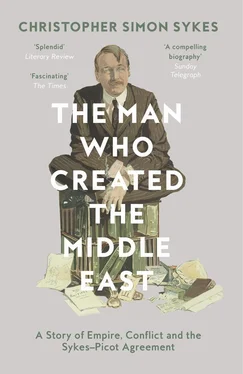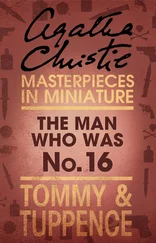It is a tribute to the monks of Beaumont that they made no attempt to force Mark into a mould into which he was not going to fit. Accepting that he would never have to earn a living, they seemed instead content with teaching him his religion. They made little attempt to ensure he did his school work, and his exercise books, rather than being crammed with Latin vocabulary and translations, were filled with entertaining histories based on Virgil and Cicero, illustrated with witty caricatures, a talent he had inherited from his mother. When Jessie, as she did from time to time, swooped down on the school to remove him to far-off places, the authorities simply turned a blind eye. ‘On several occasions,’ remembered Wilfred Bowring, ‘Lady Sykes, generally half-way through term, announced that she proposed to take Mark on a journey of indefinite length. Mark vanished from our ken for about six months, when he reappeared laden with curios from the countries he had visited. These curios nearly always took the shape of lethal weapons, most welcome gifts for his school cronies. He returned from these trips with a smattering of strange tongues … full of the habits, customs, history and folk-lore of the countries he had visited.’ 43Most boys, one might expect, would have been spoiled by this kind of upbringing. ‘Not so Mark,’ wrote one of his teachers, Father Cuthbert Elwes. ‘Though he was undoubtedly a remarkably intelligent and intensely amusing boy, his chief charm was his great simplicity and openness of character and entire freedom from human respect.’ 44
On his return to school, he invariably attracted a large crowd around him to listen to the extraordinary stories he had to tell. Sitting cross-legged and often puffing on a hubble-bubble, he regaled them with tales of being taken by his father to a mountain in the desert that was home to ‘the weird Druses of Lebanon’, whom few schoolboys could name, let alone place; of sleeping in tents on the edge of the Sea of Galilee; and of the dreadful scenes he witnessed in the lunatic asylum in Damascus, where wretched madmen imprisoned in tiny kennels, each six feet by five, ‘clamoured and howled the lifelong day; over their ankles in their own ordure, naked save for their chains, these wretched beings shrieked and jibbered! Happy were those who, completely insane, laughed and sang in this inferno.’ 45
‘He was a consummate actor,’ wrote Father Elwes. ‘On a wet day, when all the boys were assembled together in the playroom, he would stand on the table and entertain his schoolfellows with a stump speech which would go on indefinitely.’ 46His talents for acting and story-telling found their truest expression when he went up to the senior school in 1892, and they gained him the only award he was ever to win at school, the elocution prize for a play he wrote and directed himself, ‘A Hyde Park Demonstration’, in which he took the leading role of the orator. He also published his first piece of writing, an article for the first issue of the Beaumont Review , entitled ‘Night in a Mexican Station’, which was an account of an incident that had taken place during a trip to Mexico he had made with his father during the winter of 1891–2. They had taken an overnight train to the north of the country, and Mark demonstrated his powers of observation in his amusing descriptions of some of the passengers in the different carriages. Those in the ‘Palace on Wheels’, for example, included ‘The Yankeeized Mexican – viz, a Mexican in frock coat and top hat; the “Rurales” officer, a gorgeous combination of leather, silver and revolvers, etc; the American “drummer”, a commercial traveller …; and lastly, the conductor – a lantern-jawed U.S. franchised Citizen, a voice several degrees sharper than a steam saw.’ 47
One boy who fell under Mark’s spell during this period was his cousin, Tom Ellis, who had left Eton to enroll at Beaumont, a move that had been engineered by Jessie, who considered him a perfect companion for her son. ‘About 1894,’ he later wrote, ‘I was enveloped in one of her whirlwind moods by Jessica and flung into the society of a large, round, amiable boy of my own age. Three years of Cheam and one of Eton had produced a sort of palaeolithic cave-boy in me with a crust of classical education. Even so I think it took me about three minutes to succumb completely to Mark’s charm, even though he opened the conversation by demanding my opinion on the Fourth Dimension … I think Mark was as lonely as I was, for he adopted me and added me to the retinue which he employed for his romantic purposes.’ 48
Ellis often spent his holidays at Sledmere, which, he later recalled, ‘was to a boy of my age remarkably like fairyland. That is, anything might happen at any moment, and strange things did happen at odd moments … Strangest of all were the queer evenings when theoretically Mark and I were both abed and asleep. I would wander alone to Mark’s room, and whilst the elders played poker savagely Mark would talk high and disposedly of everything in the world and often of things not even discussed in public. It was my great good fortune to be introduced to the vile and ignoble things of the world by the only soul I have known who seemed to be completely proved against them. All those sexual matters, that are hinted at, boggled, hatched and evaded until the boy is initiated into a mystery in the grubby way of experience, were for Mark either dreary commonplace or subjects suited to Homeric laughter. At the same time Mark maintained that high matters should be gravely discussed with the aid of a two-stemmed hubble-bubble.’ 49
Mark was fifteen now and driven by an insatiable curiosity about the world. Everything he read about he was keen to put into practice. Military history was still one of his passions and he eagerly introduced his new friend to Vauban’s New Methods of Fortification . No longer satisfied with merely looking at the diagrams, he decided they should bring them to life: ‘nothing would satisfy Mark but a model siege upon the lawn,’ recalled Ellis, ‘so shortly there rose a fortress about ten foot square, laid out strictly according to Vauban, bastions, lunettes, redans and all else. Guns were represented by door bolts, and I was told off to invest the fortress scientifically. With a saloon rifle apiece, we fired alternate shots, but any digging involved the loss of a shot. This meant that I dug madly while Mark shot … By the third day of the siege the lawn was a nightmare. I had closed upon the doomed fortress, and, joy of joys, I looked like beating Mark at one of his own games. About this moment Sir Tatton glanced at what had once been a fair lawn and was now a mole’s Walpurgis night. I faded into the horizon, but Mark came out of the situation manfully. Sir Tatton was then ploughing up the park “to sweeten the ground”. And Mark maintained that our performance was doing the same for the lawn!’ 50
These military games became more and more elaborate, with Mark calling on children from the village to play the part of troops, which he, being the young master, could command without opposition. He devised complicated battles in the park and paddocks, in which he devoted great attention to the working out of tactics and the designing of fortifications. Poor old Grayson often found himself drawn into these. ‘Witness the battle of Sledmere Church,’ remembered Tom Ellis, ‘which nearly brought about the death of Grayson … Mark ordained that the church was to stand the onslaught of the heretics, represented by old Grayson and the twins of Jones, the jockey. After a prolonged siege the heretics attempted to take the outer palisades of the church by escalade, and were repulsed with one casualty. Old Grayson, being eighty, was not of an age to stand a fall from a fifteen-foot ladder.’ 51
Читать дальше











